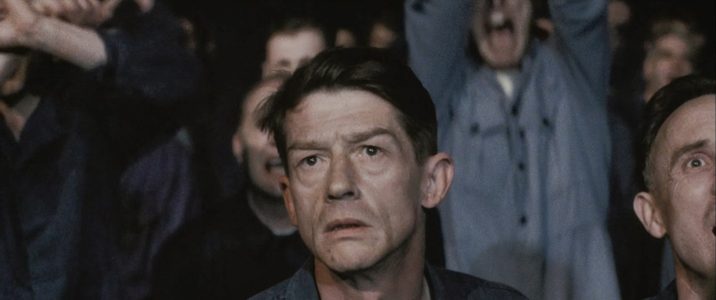Summarizing the remarkable career of John Hurt is a difficult task. How can one properly describe the tremendous presence this actor had when, more often than not, he embalmed himself within the framework of the films he acted in rather than attempting to make an overly conscious impression on the audience through easily recognizable tics and idiosyncrasies? Yes, he has had his share of memorable moments, arguably none more ubiquitous than being on the receiving end of the chest-bursting scene in the original Alien. But what made John Hurt such an extraordinary chameleon in the cinema, from playing the noblest heroes to the slimiest villains, was his unwavering knack for pinpointing the frail humanity in each and every character he brought to life.
Hurt first found his calling when he performed onstage at the age of nine in a production of Maurice Maeterlinck’s The Bluebird. It was a small role, but the experience was enough to convince him that he “felt absolutely in the right place.” Most of the adult figures in his life were dismissive of his aspirations, including his parents who strongly felt he should pursue a more “secure” profession like teaching. Though he did study to be an art teacher at St. Martin’s School of Art, Hurt acquired a scholarship for the Royal Academy of Dramatic Art, and immediately after his two-year study found himself in his first acting role in 1962 with The Wild and the Willing, which was also the cinematic debut of Ian McShane. Hurt would go on to land minor though memorable roles in prestigious work like A Man For All Seasons, and it is here that one can see not only the blossoming of a major talent but almost a semi-autobiographical fragment of Hurt’s own conflict with the wishes of his elders.
By the 1970s, Hurt had positioned himself as a consistent character actor appearing in the works of filmmakers as varied as Jacques Demy, Richard Fleischer, and Tony Richardson. But it wasn’t until the end of the decade that Hurt would find himself suddenly thrust into fame with a number of prolific roles, starting in 1978 with Alan Parker’s critically acclaimed though controversial Midnight Express, for which he received his first Academy Award nomination. The following year, he became synonymous with one of the most indelible images in horror cinema starring as the ill-fated Kane in Ridley Scott’s Alien. The fate of Hurt’s character is no longer as shocking as it was for those who first saw the film back in the summer of ’79, but it nevertheless retains a potency, thanks in no small part to Hurt’s performance. In the span of a brutally short period of time, we see him oscillate from camaraderie, to terror, and finally sheer agony. Hurt somehow avoids overacting the scene, and it is a harrowing testament to the film’s existentialist horror that we feel less like we’re seeing a special effect come out of an actor than we are witnessing the horrible, ignominious death of a human being.
One year after the release of Alien, Hurt cemented his status as one of the perennial thespians of his generation by starring in The Elephant Man, David Lynch’s biopic of John Merrick. The film itself was an immediate success and garnered eight Oscar nominations, including Best Picture, as well as launching the career of Lynch and instigating a renewed focus on an achievement in makeup that the Academy would honor starting the succeeding year. But in an extraordinary cast that includes Anthony Hopkins, John Gielgud, and Anne Bancroft, the film belongs firmly to Hurt. It is easy to underestimate the power of Hurt’s performance when he is encased in makeup, but watching the film on several occasions, I have been struck by how Hurt underplays the role. The result is a showcase for what made Hurt such an inimitable talent for completely committing himself to whatever was required of him until the distinction between actor and character is fully eradicated. With very little use of his facial expressions, Hurt conveys fear, humility, and sadness as Merrick, and though the film itself is flawed, Hurt remains the crown jewel of the entire enterprise. The only reason he could have lost the Oscar that year was by competing against an equally iconic performance, which is indeed what happened with Robert De Niro in Raging Bull. Nevertheless, Hurt’s marvelous performance remains electrifying.
For nearly the last forty years of his life, John Hurt remained a stalwart fixture of film and television. He consistently made use of his vocal prowess as an actor in works ranging from The Plague Dogs to Watership Down and proved time and again his versatility in his live-action efforts. Who else could play both Winston Smith and the Alan Moore equivalent of Big Brother? How many actors had the range to play the Horned King and Jesus himself? Again, the genius of Hurt was his uncanny ability to inhabit a given role without drawing attention away from the rest of the ensemble. He displayed this time and again working with a diverse set of directors that, in addition to the aforementioned, included Don Bluth, Bong Joon-ho, Jim Jarmusch, Steven Spielberg, Guillermo del Toro, and Lars von Trier, just to name a few. By doggedly dedicating himself to his lifelong vocation, John Hurt showed all of us new ways of relating to one another at our most compassionate and least forgiving, and for that his work shall endure through the ages.
